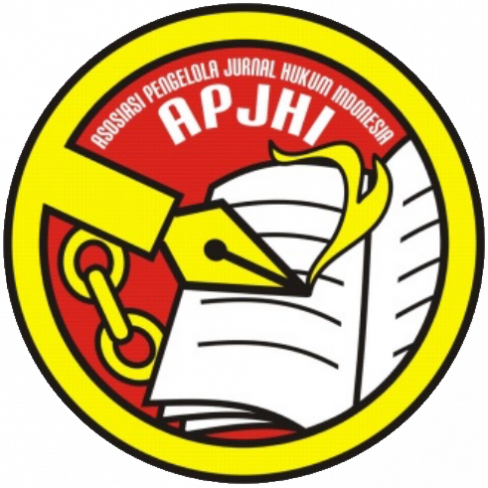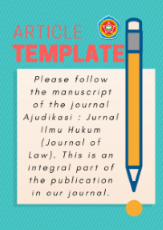Implikasi Regulasi Tindak Pidana Illegal Logging Terhadap Kelestarian Lingkungan Hidup Ditinjau Dalam Perspektif Hukum Lingkungan
DOI:
https://doi.org/10.30656/ajudikasi.v4i2.2748Abstract
Illegal logging is the activity of logging, transporting timber and selling timber which is a form of factual threat around borders that are illegal or do not have a permit from the authorities. These activities can cause environmental pollution and destruction which have a direct impact on environmental preservation. Illegal Logging in the substance of Law Number 32 of 2009 concerning Environmental Protection and Management (UUPPLH) is an act of a person that causes direct or indirect changes to the physical, chemical and biological characteristics of the environment so that it exceeds the standard criteria for environmental damage. Illegal logging practices that do not respect forest sustainability have resulted in invaluable destruction of forest resources. Even people's lives will also be directly affected, because state income is reduced by the loss of local biodiversity. This type of research uses normative legal research, the approach method used is the normative juridical approach with the aim of this research is to find out about how is the responsibility of criminal law in the field of illegal logging for environmental sustainability in the perspective of environmental criminal law. The result is that this act of illegal logging is punishable by imprisonment of at least 10 to 15 years, as well as an administrative sanction of Rp. 10-15 billion contained in article 78 of Law Number 41 Year 1999 concerning Forestry. Not only that, this illegal logging will also be more widely discussed if it is linked to forest encroachment which is also carried out illegally. These two activities can be described as Looting the Forest. Law on Environmental Management and Protection Number 32 Year 2009 hereinafter referred to as UUPPLH Number 32 Year 2009 has brought changes based on environmental management and protection in Indonesia. In the concept of criminal law, it explains the principle of ultimum remidium which is said to be the last resort for certain formal crimes.
Keywords: Regulations; Environmental; Illegal; Log; Criminal;
Downloads
References
Buku :
Hardjasoemantri, Koesndi. Hukum Tata Lingkungan. Yogyakarta: Press. 2005.
Kartoduharjo, Haryadi. Modus Operandi, scientific Evidence dan Legal Evidence dalam kasus Illegal Logging. Jakata: Makalah disampaikan dalam Pelatihan Hakim Penegakan Hukum Lingkungan yang diselenggarakan oleh ICEL bekerjasama dengan Mahkamah Agung RI. 2003.
Muladi, Arief Barda Nawawi. Teori-teori dan Kebijakan Pidana. Bandung: Alumni. 1984.
Sukardi. Illegal Logging Dalam Perspektif Politik Hukum Pidana Kasus Papua. Yogyakarta: Penerbit Universitas Atma Jaya Yogyakarta. 2005.
Sunarso, Siswanto. Hukum Pidana Lingkungan Hidup dan Strategi penyelesaian sengketa. Jakarta: Rineka Cipta. 2005.
Jaya, Serikat Putra, Nyoman. Kapita Selekta Hukum Pidana. Semarang: Badan Penerbit Undip. 2005.
Jurnal
Andhini, Alycia Sandra Dina, and Ridwan Arifin. “Analisis Perlindungan Hukum Terhadap Tindak Kekerasan Pada Anak Di Indonesia.†Ajudikasi : Jurnal Ilmu Hukum Vol. 3, No. 1 (2019): 41–52. https://doi.org/10.30656/ajudikasi.v3i1.992.
Fuqoha, Fuqoha, Indrianti Azhar Firdausi, and Arga Eka Sanjaya. “Perlindungan Hukum Terhadap Intervensi Pemberitaan Dalam Kerangka Kemerdekaan Pers Nasional.†Ajudikasi : Jurnal Ilmu Hukum Vol. 3, No. 1 (2019): 75. https://doi.org/10.30656/ajudikasi.v3i1.1436.
Fadliah. “Problematika Penanganan Illegal Loggingâ€. Jurnal Legalitas. Volume 2. Nomor.1. Februari 2009.
Syerra Felia, Fani Budi Kartika. “Tindak Pidana Illegal Logging Ditinjau Dari Perspektif Undang-Undang No 32 Tahun 2009 Tentang Perlindungan Dan Pengelolaan Lingkungan Hidupâ€. Jurnal Lex Justitia, Vol. 1 No. 2 Juli 2019 Issn : 2656-1530.
Tesis
Utami, Tuty Budhi. “Kebijakan Hukum Pidana Dalam Menanggulangi Tindak Pidana Illegal Loggingâ€. Tesis, Program Pasca Sarjana Ilmu Hukum Universitas Dipononegoro. April 2007.
Peraturan Perundang-undamgan
Indonesia, Undang-undang Dasar Negara Republik Indonesia 1945.
Indonesia, Undang-undang Nomor 5 Tahun 1960 Tentang Peraturan Dasar Pokok-pokok Agraria.
Indonesia, Undang-undang Nomor 5 Tahun 1967 Tentang Ketentuan-ketentuan Pokok Kehutanan.
Indonesia, Undang-undang Nomor 39 Tahun 1999 Tentang Hak Asasi Manusia.
Indonesia, Undang-undang Nomor 41 Tahun 1999 Tentang Kehutanan.
Indonesia, Undang-undang Nomor 32 Tahun 2009 Tentang Perlindungan dan Pengelolaan Lingkungan Hidup.
Indonesia, Undang-undang Nomor 18 Tahun 2013 Tentang Pencegahan dan Pemberantasan Perusakan Hutan.
________. Intruksi Presiden Nomor 5 Tahun 2001 Tentang Pemberantasan Penebangan Kayu Illegal (Illegal Logging) dan Peredaran Hasil Hutan Illegal di Kawasan Ekosistem Leuser dan Taman Nasional Tanjung Puting.
Kamus
Garner. Black Law Dictionary. Dalas: West Group. 1999.
Salim. Kamus Indonesia Inggris. Jakarta: Modern English Press. 1987.
Downloads
Published
Issue
Section
License
Authors who publish with this journal agree to the following terms:
Authors retain copyright and grant the journal right of first publication with the work simultaneously licensed under a Creative Commons Attribution License that allows others to share the work with an acknowledgment of the work's authorship and initial publication in this journal.
Authors can enter into separate, additional contractual arrangements for the non-exclusive distribution of the journal's published version of the work (e.g., post it to an institutional repository or publish it in a book) with an acknowledgment of its initial publication in this journal.
Authors are permitted and encouraged to post their work online (e.g., in institutional repositories or on their website) before and during the submission process, as it can lead to productive exchanges and earlier and greater citation of published work.
All articles in Ajudikasi : Jurnal Ilmu Hukum can be disseminated provided they include the identity of the article and the source of the article (Ajudikasi : Jurnal Ilmu Hukum). The publisher is not responsible for the contents of the article. The content of the article is the sole responsibility of the author
Ajudikasi : Jurnal Ilmu Hukum is lincensed under a Creative Commons Attribution-ShareAlike 4.0 International License.










1.png)
.png)
.png)





.png)
.png)
.png)
.png)





.png)







